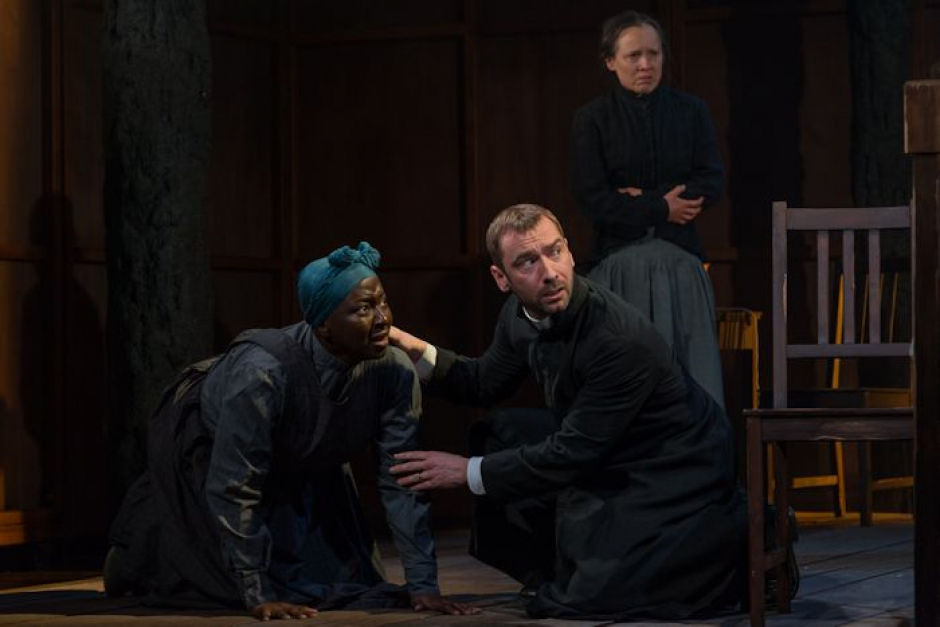The Crucible, Manchester Opera House, May 8 2017.
“There is a prodigious fear of the court in the country,” we are told in the second half of Douglas Rintoul’s production of Arthur Miller’s 1950 play, The Crucible – and for a minute, there is a ripple, a shudder, across the audience in the Opera House, as if this is what we have come for: relevance. We know that Miller wrote the play in reaction to the McCarthyite Communist witch-hunts but we want Rintoul and his cast to retool this for our times because, after all, what times we live in. We want a Crucible for Brexit, a Crucible for Trump (oh how we want a crucible for Trump), a Crucible for Theresa May and the five billionaires who control over 80% of the media in the UK, we want a Crucible that draws its lessons close to home, that opens our eyes, that helps us to see. We do not get it.
That would be okay if what we got was a barnstorming production of The Crucible – a production of The Crucible that just did the job. After all, it is one of those inviolate plays: a modern classic written by a genius at the very height of his powers. There are lines here that grab you by the lapels. I’m thinking, “I will come to you in the black of some terrible night and I will bring a pointy reckoning that will shudder you.” I’m thinking, “the little crazy children are jangling the keys of the kingdom, and common vengeance writes the law!” I’m thinking, “Life, woman, life is God’s most precious gift; no principle, however glorious, may justify the taking of it.” There are dozens of examples of lines written by Miller that have grown larger than the play, that have entered the lexicon, that resonate even if delivered badly, even if rudely shouted, even if uttered too quietly. The best things about Douglas Rintoul’s production remain Miller’s words; the sad thing is that, too often, they are not given the platform from which to shine at their brightest.
It isn’t that the production is bad. It’s just flat. It rarely comes alive. And this despite a couple of name actors in the cast (Charlie Condou, best known from Coronation Street and playing the Reverend Hale, a part played by Daniel Day Lewis in the most recent film adaptation, and Victoria Yeates from Call the Midwife in the role of Elizabeth Proctor). There are a number of things that get in the way. First, there’s what we will call a lack of nuance. From the opening, as Cornelius Clarke’s Reverend Paris is joined onstage by a gradually increasing number of characters, it seems as if each feels the only way to make themselves heard is to bellow. And so we have a number of characters upon the stage bellowing at one another. This lack of nuance is conjoined early on by what we will say are strange choices when it comes to both sound and lighting – characters illuminated by either eerie music or thunder and lightning as they appear in doorways. We get it. It’s an auspicious night. Later, though, after the crazy children have started jangling the keys, sound and lighting seem to suggest that maybe just maybe the children aren’t crazy after all – maybe there is some witchcraft afoot, maybe we are right to be frightened of what it is the children are seeing. Which misses the point. There should be no confusion as to the moral heart of the play. (We were reminded of a playful adaptation of Macbeth at the Royal Exchange back in 2010/2011 in which the witches were children, given to dancing to Pink’s So What? – those witches were fucking terrifying and that production got the fear absolutely right. This production of The Crucible could learn a lot from that.)
The story that should grip us is that of the relationship between Elizabeth Proctor and her husband John, played by Eoin Slattery. He has cheated on her with the young girl Abigail Williams, who, rejected, names her former lover’s wife as a witch. In seeking to exonerate her, he succumbs to the machinations of twisted law himself and – well, it isn’t quite a spoiler to say that things don’t end well for mostly all concerned. We have betrayal, vengeance and ultimately love, forgiveness, courage and tragedy. It’s a Wagyu steak of a drama. And yet, time and again, the Wagyu is served up as if it’s a McDonald’s. One scene in particular, in which Elizabeth and John meet for the final time, in the dank gloom of a prison cell, the authorities wanting John to capitulate and thereby grant their terrible measures a hint of validation. The audience should be held as if in the grip of a huge and terrible fist. And yet everyone fidgets. You read it in every slumped shoulder, in every glance at the wrist, in every sly phone screen time check. This is not what it should be.
Rintoul’s Crucible, then, is something of a disappointment, something of a missed opportunity. The cast seem to know it too as they greet the half empty theatre’s lack of an ovation with a Mako shark cast to the eye and a shrug of, well, what else did we expect? One to lower your expectations for if you plan to catch it on the rest of its tour.

